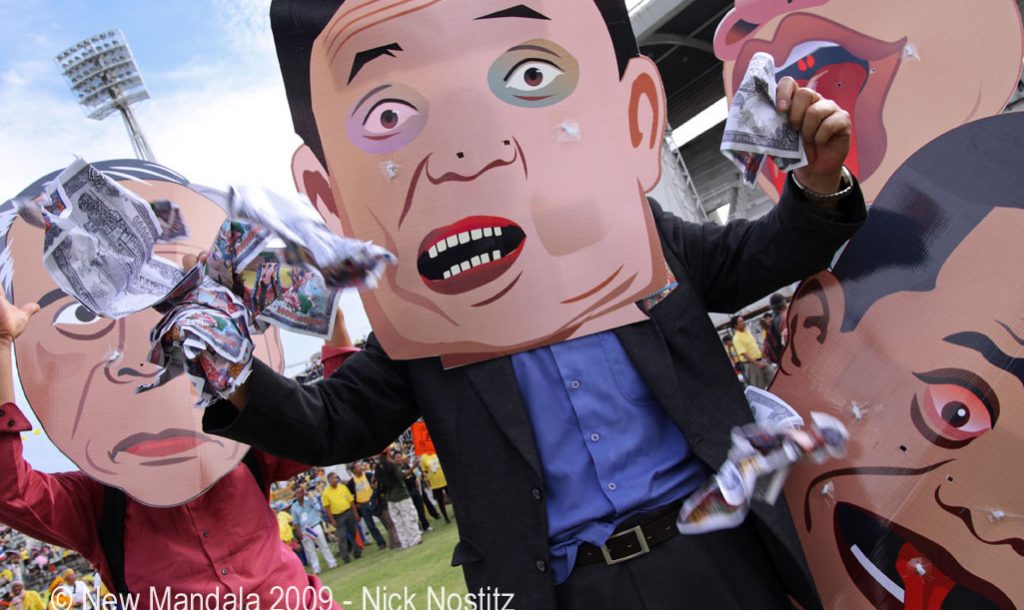Once again Thailand stands on the brink. Street protests threatens to engulf the capital of Bangkok with protesters opposing a blanket amnesty bill that might see the return of deposed Prime Minister Thaksin Shinawatra. Familiar rhetoric from the far and recent past have cropped up including the old notion that Thailand simply is not ready for democracy. This argument is especially whispered among the traditional elite, the middle class protesters, and the back rooms of old boy networks across the country. To play the Devil’s advocate for a second, let me quote venerable historian Will Durant who wrote, at the end of his career in his book The Lessons of History that:
Democracy is the most difficult form of government, since it requires the widest spread of intelligence and we forgot to make ourselves intelligent when we made ourselves sovereign. Education has spread, but intelligence is perpetually retarded by the fertility of the simple….[ignorance] lends itself to manipulation by the forces that mold public opinion.”
Perhaps it is true then that democracy is ruled not by the intelligent in society but by the common man. Yet if the old establishment of this country are complaining that their society is being undermined by the ignorant and easily manipulated of this country, can they really have anyone to blame but themselves? At every turn in our country’s history, when we have had the chance at progressing and developing a society that was civil, informed and more democratic, the entrenched elements of the governing apparatus have stopped it in its track. Even worse they often solicit the help or at the very least the approval of the middle class. Take for instance in 1976 when students and activists were protesting the return of Thanom Kittikachon, a man who had violently put down the country’s first widespread protests just three years prior. Citing the infiltration of communists, the leaders of the country with the help of the Thai middle class and nationalists chose to end the protests with violence while citing loyalty to the state, to the monarchy and bizarrely to democracy.
What lessons did that teach the students and the wider population of 1976? It taught them that intelligence and activism had no place in Thailand. It showed that Thailand was not ready for a civil society. It drove the students underground and upcountry and gave a stern warning to future students and leaders that intellectual discourse no matter how civil and peaceful had no place in here.
This phenomenon was hardly unique to the country’s history. In fact under his government, Thaksin oversaw a vast erosion of civil liberties, press freedoms and instituted a program of extra-judicial justice that laughed at the very notion of courts and laws. His crimes are well documented and overeported so lets fast forward in time to the present day. Once again we stand at a crossroads and once again various forces will try to pick apart the small incremental progress that we have made.
I wrote this on social media the other day:
If you committed a crime and are found guilty, you should face punishment even if the whole country votes otherwise. This is the only way a democracy can work, when the laws are respected and above the tamperings of the system. Democracy stands not on just the leg of popular support but also it’s various institutions. To undermine one, is to destroy the foundations of the others. On the other hand don’t let your hatred for one man become a hatred for the system.
It is not a revelation but rather a straightforward and obvious observation. But what many people often forget, and observers like Thitinan Pongsudhirak of ISIS and Thomas Fuller of the New York Times try to remind us, is that Thaksin has brought about one major positive change. That positive change is the political awakening of, excuse my obvious internationalism, the proletariat. This is the reason why so many observers both external and internal reported positively about the protests in 2010. It was the recognition by the masses of their own power, a true awakening of democracy.
Now today, we see the attempts of a man to harness that awakening for his own gain and in doing so undermine the foundations of our democracy. It is right and necessary to oppose such motions. But on the same token the people who are sprinting forward towards a dramatic showdown with this perceived monstrosity should take pains to tread carefully. For in this early stage of self-awareness, it would be too easy to crush with tanks and courts the political will of the masses by citing their ease to manipulation and their lack of awareness. To do so would be a mistake. Those who would oppose Thaksin and his tyranny must do so without destroying the system. The opposition must understand that awakening leads to awareness.
The seeds of democracy may have been sown by an autocrat but it must be allowed to grow unhindered by the misgivings of the paternalists. Perhaps right now the right to vote may resemble Ambrose Bierce’s definition that it is “an instrument and symbol of a freeman’s power to make a fool of himself and a wreck of his country” but it will not always be. Those that would govern unnaturally must give way to this growing movement. Only then can we prevent a future scenario where someone might once again complain that “Thailand is not ready for a democracy.”
Cod Satrusayang is a writer and blogger based in Bangkok. His new book The Fall is due out in the summer of 2014.
 Facebook
Facebook  Twitter
Twitter  Soundcloud
Soundcloud  Youtube
Youtube  Rss
Rss 
